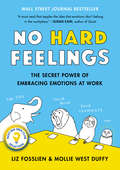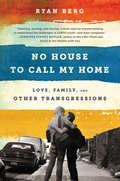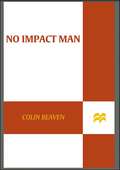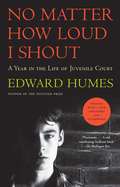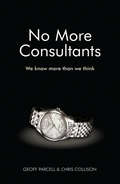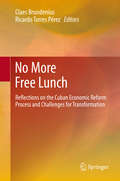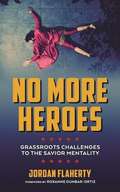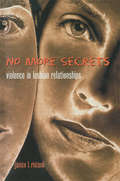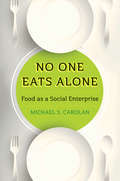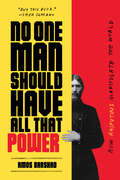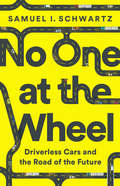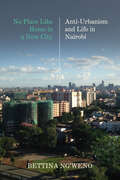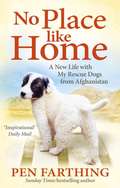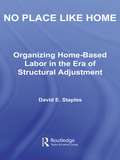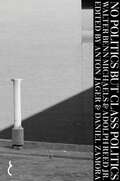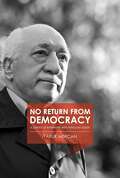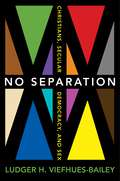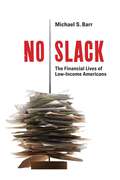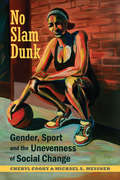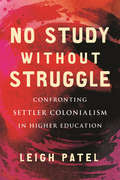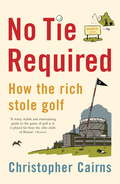- Table View
- List View
No Hard Feelings: The Secret Power of Embracing Emotions at Work
by Liz Fosslien Mollie West Duffy"A must-read that topples the idea that emotions don't belong in the workplace."--Susan Cain, author of Quiet A hilarious guide to effectively expressing your emotions at the office, finding fulfillment, and defining work-life balance on your own terms.How do you stop the office grouch from ruining your day? How do you enjoy a vacation without obsessing about the unanswered emails in your inbox? If you're a boss, what should you do when your new, eager hire wants to follow you on Instagram? The modern workplace can be an emotional minefield, filled with confusing power structures and unwritten rules. We're expected to be authentic, but not too authentic. Professional, but not stiff. Friendly, but not an oversharer. Easier said than done!As both organizational consultants and regular people, we know what it's like to experience uncomfortable emotions at work - everything from mild jealousy and insecurity to panic and rage. Ignoring or suppressing what you feel hurts your health and productivity -- but so does letting your emotions run wild.Our goal in this book is to teach you how to figure out which emotions to toss, which to keep to yourself, and which to express in order to be both happier and more effective. We'll share some surprising new strategies, such as: * Be selectively vulnerable: Be honest about how you feel, but don't burden others with your deepest problems. * Remember that your feelings aren't facts: What we say isn't always what we mean. In times of conflict and miscommunication, try to talk about your emotions without getting emotional. * Be less passionate about your job: Taking a chill pill can actually make you healthier and more focused.Drawing on what we've learned from behavioral economics, psychology, and our own experiences at countless organizations, we'll show you how to bring your best self (and your whole self) to work every day.
No House to Call My Home: Love, Family, and Other Transgressions
by Ryan BergIn this lyrical debut, Ryan Berg immerses readers in the gritty, dangerous, and shockingly underreported world of homeless LGBTQ teens in New York. As a caseworker in a group home for disowned LGBTQ teenagers, Berg witnessed the struggles, fears, and ambitions of these disconnected youth as they resisted the pull of the street, tottering between destruction and survival.Focusing on the lives and loves of eight unforgettable youth, No House to Call My Home traces their efforts to break away from dangerous sex work and cycles of drug and alcohol abuse, and, in the process, to heal from years of trauma. From Bella's fervent desire for stability to Christina's irrepressible dreams of stardom to Benny's continuing efforts to find someone to love him, Berg uncovers the real lives behind the harrowing statistics: over 4,000 youth are homeless in New York City-43 percent of them identify as LGBTQ.Through these stories, Berg compels us to rethink the way we define privilege, identity, love, and family. Beyond the tears, bluster, and bravado, he reveals the force that allows them to carry on-the irrepressible hope of youth.
No Impact Man: The Adventures of a Guilty Liberal Who Attempts to Save the Planet and the Discoveries He Makes About Himself and Our Way of Life in the Process
by Colin BeavanBill McKibben meets Bill Bryson in this seriously engaging look at one man's decision to put his money where his mouth is and go off the grid for one year—while still living in New York City—to see if it's possible to make no net impact on the environment.In No Impact Man, a guilty liberal finally snaps, swears off plastic, goes organic, becomes a bicycle nut, turns off his power, and generally becomes a tree-hugging lunatic who tries to save the polar bears and the rest of the planet from environmental catastrophe while dragging his baby daughter and Prada-wearing, Four Seasons–loving wife along for the ride. And that's just the beginning. In other words, no trash, no toxins in the water, no elevators, no subway, no products in packaging, no air-conditioning, no television . . .What would it be like to try to live a no-impact lifestyle? Is it possible? Could it catch on? Is living this way more satisfying or less satisfying? Harder or easier? Is it worthwhile or senseless? Are we all doomed or can our culture reduce the barriers to sustainable living so it becomes as easy as falling off a log? These are the questions at the heart of this whole mad endeavor, via which Colin Beavan hopes to explain to the rest of us how we can realistically live a more "eco-effective" and by turns more content life in an age of inconvenient truths.
No Matter How Loud I Shout: A Year in the Life of Juvenile Court
by Edward HumesNow updated with a new introduction and afterword, this award-winning examination of the nation's largest juvenile criminal justice system in Los Angeles by a Pulitzer Prize-winning journalist is "an important book with a message of great urgency, especially to all concerned with the future of America's children" (Booklist).In an age when violence and crime by young people is again on the rise, No Matter How Loud I Shout offers a rare look inside the juvenile court system that deals with these children and the impact decisions made in the courts had on the rest of their lives. Granted unprecedented access to the Los Angeles Juvenile Court, including the judges, the probation officers, and the children themselves, Edward Humes creates an unforgettable portrait of a chaotic system that is neither saving our children in danger nor protecting us from adolescent violence. Yet he shows us there is also hope in the handful of courageous individuals working tirelessly to triumph over seemingly insurmountable odds. Weaving together a poignant, compelling narrative with razor-sharp investigative reporting, No Matter How Loud I Shout is a convincingly reported, profoundly disturbing discussion of the Los Angeles juvenile court's failings, providing terrifying evidence of the system's inability to slow juvenile crime or to make even a reasonable stab at rehabilitating troubled young offenders. Humes draws an alarming portrait of a judicial system in disarray.
No More Consultants
by Chris Collison Geoff ParcellThis book provides you with the tools to tap into the capabilities that already exist in your organization, but are as yet inaccessible. The book shows you how to make maximum use and accessibility of existing knowledge by implementing a successful tool, The River Diagram. This tool will help reveal your organization's strengths and weaknesses, which will aid you in resolving an internal problem. Illustrated using an exciting range of case studies including BP, Oracle, UNAIDS, and others, this book will guide you towards saving both time and money.
No More Free Lunch
by Claes Brundenius Ricardo Torres PérezIn September 2010, the Cuban government decided to embark on an economic reform program, unprecedented after the Revolution in 1959. This opened up opportunities for Cuban economists and scholars to participate in the development of the reform program. Thanks to grants from SSRC (Social Sciences Research Council, New York) and the Norwegian Ministry of Foreign Affairs, several researchers from the Cuban think tank CEEC (Center for Studies of the Cuban Economy, Havana) got an opportunity to visit countries that could be of interest for the reform process, notably Vietnam, but also Brazil, South Africa and Norway. The result of these field visits and a subsequent workshop involving contributions from Cuban as well as non-Cuban scholars, this volume showcases unprecedented new insights into the process and prospects for reform along many dimensions, including foreign direct investment, import substitution, entrepreneurship and business creation, science and technology development, and fiscal policies. The resulting analysis, in a comparative perspective, provides a framework for future research as well as for business practice and policymaking.
No More Heroes: Grassroots Challenges to the Savior Mentality
by Jordan FlahertyMissionaries of the left, saviors are people of privilege who believe they have all the answers. They want to help, but don't want to listen; they lead but never follow. From post-Katrina New Orleans, to anti-sex-traficking work, to do-gooder journalists, Flaherty's book reveals saviors' misdeeds but also shows how activists can build new, stronger movements.
No More Secrets: Violence in Lesbian Relationships
by Janice RistockViolence is a male biological trait. When women fight, no one gets seriously hurt. Lesbians don't abuse their spouses. The truth revealed in Janice Ristock's groundbreaking book is that lesbian relationships sometimes do turn violent. Based on interviews with more than one hundred lesbians who have suffered abuse and seventy-five case workers, No More Secrets is the first in-depth account of this startling phenomenon. Although one in four gay and lesbian couples are affected by domestic violence, the problem has remained hidden for several reasons. By giving voice to the victims, Ristock helps women to address violence by breaking silences, sharing secrets, and naming the forms of abuse.
No One Eats Alone: Food as a Social Enterprise
by Michael S. CarolanIn today's fast-paced, fast food world, everyone seems to be eating alone, all the time—whether it's at their desks or in the car. Michael Carolan argues that needs to change if we want healthy, equitable, and sustainable food. We can no longer afford to ignore human connections as we struggle with dire problems like hunger, obesity, toxic pesticides, antibiotic resistance, depressed rural economies, and low-wage labor. In No One Eats Alone he tells the stories of people getting together to change their relationship to food and to each other—from community farms where suburban moms and immigrant families work side by side, to online exchanges where entrepreneurs share kitchen space, to "hackers” who trade information about farm machinery repairs. This is how real change happens, Carolan contends: when we start acting like citizens first and consumers second.
No One Man Should Have All That Power: How Rasputins Manipulate the World
by Amos BarshadIn this exploration of shadowy, behind-the-scenes operators, “each portrait provides an incisive dissection of the acquisition and maintenance of power” (The Nation).Journalist Amos Barshad has long been fascinated by the powerful. But not by elected officials or natural leaders—he’s interested in the dark figures who wield power from the shadows. And, as Barshad shows in No One Man Should Have All That Power, these master manipulators are not confined to political backrooms. They can be found anywhere—from Hollywood to drug cartels, recording studios, or the NFL.In this wide-ranging, insightful exploration of the phenomenon, Barshad takes readers into the lives of more than a dozen notorious figures, starting with Grigori Rasputin himself. The Russian mystic drank, danced, and healed his way into a position of power behind the last of the tsars.Based on interviews with well-known personalities like Scooter Braun (Justin Bieber’s manager), Alex Guerrero (Tom Brady’s trainer), and Sam Nunberg (Trump’s former aide) and original reporting on figures like Nicaragua’s powerful first lady Rosario Murillo and the Tijuana cartel boss known as “Narcomami,” Barshad investigates a variety of modern-day Raputins. He explores how they got there, how they wielded control, and what lessons we can take from them, including how to spot Rasputins in the wild.
No One at the Wheel: Driverless Cars and the Road of the Future
by Karen Kelly Samuel I. SchwartzThe country's leading transport expert describes how the driverless vehicle revolution will transform highways, cities, workplaces and laws not just here, but across the globe. Our time at the wheel is done. Driving will become illegal, as human drivers will be demonstrably more dangerous than cars that pilot themselves. Is this an impossible future, or a revolution just around the corner?Sam Schwartz, America's most celebrated transportation guru, describes in this book the revolution in self-driving cars. The ramifications will be dramatic, and the transition will be far from seamless. It will overturn the job market for the one in seven Americans who work in the trucking industry. It will cause us to grapple with new ethical dilemmas-if a car will hit a person or a building, endangering the lives of its passengers, who will decide what it does? It will further erode our privacy, since the vehicle can relay our location at any moment. And, like every other computer-controlled device, it can be vulnerable to hacking.Right now, every major car maker here and abroad is working on bringing autonomous vehicles to consumers. The fleets are getting ready to roll and nothing will ever be the same, and this book shows us what the future has in store.
No Place Like Home in a New City: Anti-Urbanism and Life in Nairobi
by Bettina Ng'wenoA free ebook version of this title is available through Luminos, University of California Press’s Open Access publishing program. Visit www.luminosoa.org to learn more. Nairobi, known as the Green City in the Sun, has taken shape through anti-urban ideologies that insist that the city cannot be home for most residents. Based on decades of experience in rapidly changing Nairobi, No Place Like Home in a New City traverses rivers, cemeteries, parks, railways, housing estates, roads, and dancehalls to explore how policies of anti-urbanism manifest across time and space, shaping how people live in Nairobi. With deeply personal insights, Bettina Ng’weno highlights how people contest anti-urbanism through their insistence on building life in the city, even in the current dynamic of ubiquitous demolition and reconstruction. Through quotidian practices and creative resistance, they imagine alternatives to displacement, create belonging, and build new urban futures.
No Place Like Home: A New Beginning with the Dogs of Afghanistan
by Pen FarthingMarley and Me meets Bravo Two Zero, in this sequel to One Dog at a Time: Saving the Strays of Afghanistan. Nowzad was a gentle giant when it came to taking treats. He never, ever snatched. To me it was just further evidence that, deep inside, there was a great dog struggling to find his way out. When Pen Farthing brings stray dogs Nowzad and Tali back from his tour of Afghanistan, little does he know what he has begun. Suddenly he has four dogs to look after—two of whom have never been housetrained. And soon he is inundated with requests from other Marines and soldiers to help bring their rescued dogs home. Whether it's little Helmand, Fubar, or Beardog, Pen does his utmost to give these dogs the chance they deserve. This is the story of one man's courage and persistence as he struggles to give his dogs at home, and those still in Afghanistan, the best possible chance. It will warm—and break—the hearts of dog lovers everywhere.
No Place Like Home: Organizing Home-Based Labor in the Era of Structural Adjustment (New Approaches in Sociology)
by David StaplesNo Place Like Home examines the emergence of home-based women workers as paradigmatic figures of contemporary capitalism, neoliberal governmentality, and socio-political contestation. Far from an isolated or contingent situation, home-based work constitutes today an enormous arena of 'invisible' social and political struggles of subaltern and ethno-racially subordinated women.
No Politics
by Anton Jäger & Daniel ZamoraDenouncing racism and celebrating diversity have become central to progressive politics. For many on the left, it seems, social justice would consist of an equitable distribution of wealth, power and esteem among racial groups. But as Adolph Reed Jr. and Walter Benn Michaels argue in this incisive collection of essays, the emphasis here is tragically misplaced. Not only can a fixation with racial disparities distract from the pervasive influence of class, it can actually end up legitimising economic inequality. As Reed and Michaels put it, “racism is real and anti-racism is both admirable and necessary, but extant racism isn’t what principally produces our inequality and anti-racism won’t eliminate it”. No Politics but Class Politics gathers together Reed and Michaels’s recent essays on inequality, along with a newly commissioned interview with the authors and an illuminating foreword by Daniel Zamora and Anton Jäger. These writings eschew the sloppy thinking and moral posturing that too often characterise discussions of race and class in favour of clear-eyed social, cultural and historical analysis. Reed and Michaels make the case here for a genuinely radical politics: a politics which aspires not to the establishment of a demographically representative social elite, but instead to economic justice for everyone.
No Return from Democracy: A Survey of Interviews with Fethullah Gulen
by Faruk MercanIt was rare, if not impossible, to find in &’80s and &’90s a Muslim cleric who spoke in favor of democracy, integration with the Western world, and universal human values. Fethullah Gülen was one of those. Many of his avant-garde ideas did not only earn him one of the largest and most influential faith-inspired social movements of recent history, but also many foes, especially from the Turkish ruling elite, placing him in the center of many social and political developments in Turkey. Despite the enormous defamation from some political groups in Turkey, Gülen is recognized in the world as a devout Muslim cleric, whose thoughts and life style are deeply rooted in the Islamic faith, but who also believes Islam is not in conflict with the progressive values of the modern world. This book collates Gülen&’s ahead-of-his-time comments on some of the debated issues as he phrased in interviews in the past few decades.
No Second Chance
by Human Rights WatchDecent and stable housing is essential for human survival and dignity, a principle affirmed both in U.S. policy and international human rights law. The United States provides federally subsidized housing to millions of low-income people who could not otherwise afford homes on their own. U.S. policies, however, exclude countless needy people with criminal records, condemning them to homelessness or transient living. Exclusions based on criminal records ostensibly protect existing tenants. There is no doubt that some prior offenders still pose a risk and may be unsuitable neighbors in many of the presently-available public housing facilities. But U.S. housing policies are so arbitrary, overbroad, and unnecessarily harsh that they exclude even people who have turned their lives around and remain law-abiding, as well as others who may never have presented any risk in the first place.
No Separation: Christians, Secular Democracy, and Sex
by Ludger H. Viefhues-BaileyThrough a potent mix of authoritarianism, heterosexism, xenophobia, and ethnoracial nationalism, powerful illiberal Christian movements have upended liberal democracies in countries that were once seen as paradigms of secular governance. Ludger H. Viefhues-Bailey offers new insight into the foundations of these movements, demonstrating how they emerge from the contradictions at the intersection of secularism and democracy.No Separation examines recent conflicts that link national identity, religion, and sexuality: debates over Muslim veiling practices in Germany, same-sex marriage in France, and migration and abortion in the United States. In each case, illiberal Christianities portray popular sovereignty as threatened at the same time as they display an obsessive concern with the politics of sex and reproduction. Underlying these conflicts, No Separation shows, is the fundamental tension of democracy—who belongs to “the People.” Viefhues-Bailey argues that when secularism and democracy meet, cultural religions appear, seeking control over women’s bodies, national borders, and the racialized reproduction of the People in defense of the ideal of popular sovereignty.Connecting political theology, political philosophy, and the sociology of religion with gender and sexuality studies, No Separation is a deeply original analysis of the crisis of democracy and the limits of secularism. It also suggests alternative ways of imagining the People, proposing a more humane vision of borders, sexualities, and social bonds.
No Slack
by Michael S. BarrThe financial crisis exposed the potentially unsavory results of the interaction between low- and moderate income households and alternative and mainstream financial institutions. Many households were overleveraged or paid high costs for financial services, while others lacked access to useful financial products that can cushion against economic instability. The financial services system is not well designed to serve low- and moderate-income households, leaving them without financial slack: they did not have adequate breathing room for making the financial adjustments that would permit them to better meet their own needs. No Slack shows us why these families were the least prepared to handle the shock of the deep recession.This pivotal analysis focuses on the Detroit metropolitan area's low- and moderate-income neighborhoods, which are similar to those of other Rust Belt communities. The Detroit Area Household Financial Services study--conducted at the height of the subprime lending boom--examines these households' decisionmaking processes, behaviors, and attitudes toward a full range of financial transactions. No Slack reveals widespread problems in home mortgage lending, the common threads among people who file for bankruptcy, the reasons so many households are unbanked, and how behaviorally informed financial regulation can make the market work better. Drawing on his deep policy experience, Michael Barr advocates helping families seek financial stability in three primary ways: enhancing individuals' financial capability, using technology to promote access to financial products and services that meet their needs, and establishing strong protections for consumers.
No Slack
by Michael S. BarrThe financial crisis exposed the potentially unsavory results of the interaction between low- and moderate income households and alternative and mainstream financial institutions. Many households were overleveraged or paid high costs for financial services, while others lacked access to useful financial products that can cushion against economic instability. The financial services system is not well designed to serve low- and moderate-income households, leaving them without financial slack: they did not have adequate breathing room for making the financial adjustments that would permit them to better meet their own needs. No Slack shows us why these families were the least prepared to handle the shock of the deep recession.This pivotal analysis focuses on the Detroit metropolitan area's low- and moderate-income neighborhoods, which are similar to those of other Rust Belt communities. The Detroit Area Household Financial Services study-conducted at the height of the subprime lending boom-examines these households' decisionmaking processes, behaviors, and attitudes toward a full range of financial transactions. No Slack reveals widespread problems in home mortgage lending, the common threads among people who file for bankruptcy, the reasons so many households are unbanked, and how behaviorally informed financial regulation can make the market work better. Drawing on his deep policy experience, Michael Barr advocates helping families seek financial stability in three primary ways: enhancing individuals' financial capability, using technology to promote access to financial products and services that meet their needs, and establishing strong protections for consumers.
No Slam Dunk: Gender, Sport and the Unevenness of Social Change (Critical Issues in Sport and Society)
by Faye Linda Wachs Michela Musto Lauren Rauscher Don Sabo Cheryl Cooky Professor Michael A. Messner Shari Dworkin Marko Begovic Carole Oglesby Marjorie Snyder Suzel Bozada-Deas Ranissa DycusIn just a few decades, sport has undergone a radical gender transformation. However, Cheryl Cooky and Michael A. Messner suggest that the progress toward gender equity in sports is far from complete. The continuing barriers to full and equal participation for young people, the far lower pay for most elite-level women athletes, and the continuing dearth of fair and equal media coverage all underline how much still has yet to change before we see gender equality in sports. The chapters in No Slam Dunk show that is this not simply a story of an “unfinished revolution.” Rather, they contend, it is simplistic optimism to assume that we are currently nearing the conclusion of a story of linear progress that ends with a certain future of equality and justice. This book provides important theoretical and empirical insights into the contemporary world of sports to help explain the unevenness of social change and how, despite significant progress, gender equality in sports has been “No Slam Dunk.”
No Study Without Struggle: Confronting Settler Colonialism in Higher Education
by Leigh PatelExamines how student protest against structural inequalities on campus pushes academic institutions to reckon with their legacy built on slavery and stolen Indigenous landsUsing campus social justice movements as an entry point, Leigh Patel shows how the struggles in higher education often directly challenged the tension between narratives of education as a pathway to improvement and the structural reality of settler colonialism that creates and protects wealth for a select few. Through original research and interviews with activists and organizers from Black Lives Matter, The Black Panther party, the Student Nonviolent Coordinating Committee, the Combahee River Collective, and the Young Lords, Patel argues that the struggle on campuses reflect a starting point for higher education to confront settler strategies. She reveals how blurring the histories of slavery and Indigenous removal only traps us in history and perpetuates race, class, and gender inequalities. By acknowledging and challenging settler colonialism, Patel outlines the importance of understanding the relationship between the struggle and study and how this understanding is vital for societal improvement.
No Tie Required: How the Rich Stole Golf
by Christopher CairnsNo Tie Required is an entertaining journey across Britain, celebrating the wonderful, eccentric and historical public courses where no club membership is required. Not for Chris Cairns the member's door and the pink gins of the 19th hole. Instead the author has sought out the country's pay-and-play courses in order to experience how non-members get their golfing fix. Public courses in Britain come in just about every shape and size: from picturesque honesty box courses in the Highlands, to converted potato fields in Essex and over-crowded city parks in London. At all these courses there are regulars who play in all weathers and who are happy to tell their stories. Behind the author's journey - apart from the joy of playing and sharing a pint or two with the locals - is the desire to trace the history of why the game's origins have been so badly relegated in status. Today a handful of highly exclusive private members clubs seem to dominate the image of golf. Is this justified? Or is the 'them and us' approach a fiction in today's Britain?
No Tie Required: How the Rich Stole Golf
by Christopher CairnsNo Tie Required is an entertaining journey across Britain, celebrating the wonderful, eccentric and historical public courses where no club membership is required. Not for Chris Cairns the member's door and the pink gins of the 19th hole. Instead the author has sought out the country's pay-and-play courses in order to experience how non-members get their golfing fix. Public courses in Britain come in just about every shape and size: from picturesque honesty box courses in the Highlands, to converted potato fields in Essex and over-crowded city parks in London. At all these courses there are regulars who play in all weathers and who are happy to tell their stories. Behind the author's journey - apart from the joy of playing and sharing a pint or two with the locals - is the desire to trace the history of why the game's origins have been so badly relegated in status. Today a handful of highly exclusive private members clubs seem to dominate the image of golf. Is this justified? Or is the 'them and us' approach a fiction in today's Britain?
No Time to Lose: A Symposium
by Pauline M. MoorMultiply impaired blind children present special educational problems and as their number increases, their educational needs are of increasing concern, because many of them arrive at school severely retarded in their development. Several years ago the American Foundation for the Blind called a seminar to discuss teaching procedures then being used, as well as ideas for new techniques. The participants came from the field of special education; most were classroom teachers who had extensive experience with multiply impaired blind children. This report is an outgrowth of that meeting.
